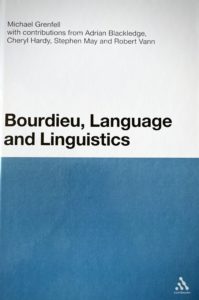In memory with gratitude of my friend and mentor Michel Blanc
I began my studies in Applied Linguistics with little or no intention to continue my work with the social philosophy of Pierre Bourdieu. However, it once again became immediately obvious that Bourdieu’s thinking about language was so much ahead of what was taken as orthodox linguistic study. His critique of Chomskyan transformational grammar was a case in point: a theory in search of a practice, or the study of something that simply did not exist. More on all this here:

Which is how I was confronted with a cupboard with hundreds of real-to-reel tapes in it at the University of London. They originated from a Sociolinguistic corpus that had been collected in Orléans, France in 1969. This had been a major undertaking, supported by large amounts of State sponsorship. The planning team had included Bourdieu and my then lecturer and mentor Michel Blanc. Various questionnaires (Sociolinguistic, Open-ended, and Close-ended) had been administered to a sample of 600 of the Orléans populace, of which 147 were finally also interviewed and recorded. The sample included individuals from across socio-economic categories, from manual and service workers industrial and commercial executives. But, then, the recordings, etc. had more or less been left…
Details of my study are set out in the extracts that follow. There are many academic issues about the theory and practice of language, its variability, what is legitimate language within one context and another, and how social provenance affects all this. These are explored in the text from a Bourdieusian perspective.
I worked with a smaller sample of the corpus – about 20 individuals. My approach was first to analyse their responses to the sociolinguistic questionnaire: what they thought about ‘good’ speech, the use of dictionaries and fountain pens, who spoke best in the neighbourhood, etc. But, I also undertook various analyses of their actual language use: incidents of elisions and liaisons in their speech, syntax, cohesion and semantic formulations, etc. There was also some correlation across these various studies.
It was fascinating listening to what they had to say. The ‘events’ of Mai 1968 were only a year passed and they had all had plenty to say about them. One could also grasp a whole different relationship to language – say between a rich manual worker made good and a secretary. In this way, it was possible to show that language use does not always correlate with economic capital – cultural capital was the main influencing factor! Luckily, Michel had already done some work with another mentor of mine – Alex Mullineaux – in combining occupational and educational capital within the corpus. I used their work.
At one point, the respondents were asked how you make an omelet: theory, practice, and language. I actually recorded these extracts and was intending to do a PhD on a study of the sociolinguistic variation within – but that is a story……
I was lucky enough to be able to speak to Bourdieu about this work both as it was proceeding and the final results I came up with. At the time it was a unique study – left, like so many others – underdeveloped. The study was very labour intensive. I spent hours and hours listening to tapes, rewinding, listening again, transcribing, with a counter in hand. As Bourdieu often said to me, working with empirical data with his approach was ‘très coûteux’, Indeed!!!
I set my work against the whole sociolinguistic versus social psychology debate; also sociology of language itself; and writers exploring the ‘symbolic value of language’ (the original title of the research) – Sankoff, Thibaut, etc.
I have divided to text up into 5 parts in order to deal with the file size:
Part 1
- Introduction
- Theory
- Objective versus Subjective/ Macro versus Micro
- The notion of ‘Champ’ – ‘Field’
- ‘Reconnaissance de la Connaissance et Connaissance de la reconnaissance’.
Part 2
- ‘La distinction and the Linguistic Market
- The Orléans Corpus
- The Population
- The Questionnaire
- The Sociolinguistic Questionnaire
- Method
- Results and analysis
Part 3
- Discussion: Self and Others
- Conclusions 1
- Footnotes 1 – 10
- Linguistic Analysis
- Phonetics and Phonology
Part 4
- Syntax
- Semantics
- Grammaticalisation and Normalisation: Discussion
- Conclusions 2
Part 5
- Further Implications
- Social Identity/ Linguistic Identity
- Language Norm
- Language Group
- Language Group, Class, and Social Change
- Conclusion
- Footnotes 25 – 34
- Appendices
- Bibliography